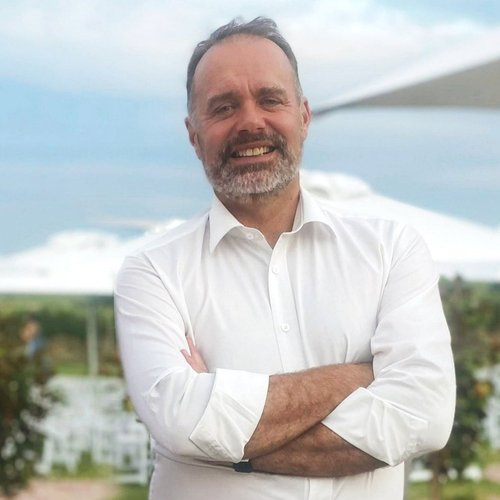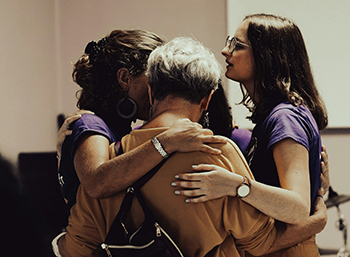Mental health care is primarily a pastoral ministry of accompaniment, which is strongly enhanced by an integration of the Catholic faith with the best of psychology, according to Catholic mental health practitioner Shawn van der Linden.
 With a recent background in Catholic Education and work experience including social work, counselling and pastoral work in parishes, Mr van der Linden now works as the international programs consultant for the US-based CatholicPsych Institute.
With a recent background in Catholic Education and work experience including social work, counselling and pastoral work in parishes, Mr van der Linden now works as the international programs consultant for the US-based CatholicPsych Institute.
“The CatholicPsych Institute are really doing some cutting-edge stuff in the area of integration of psychology and the Catholic faith,” he said.
“In our Catholic faith, we know the purpose of being human is to be in relationship with others and with God, and that's where true happiness and well-being can be found.
“If that's the case, then our mental health services and counselling services should be founded upon that blueprint, because that's the essence of what brings healing, happiness and human flourishing.”
This idea of integration, Mr van der Linden said, demonstrates just how much the Church has to offer the world in the area of mental health, in addition to its rich history of valuing the whole person – body, mind and soul.
“We should proclaim very loudly, as Catholics, that we want to pay attention to the whole person… that what is happening in your body, and what you're feeling in your body really matters,” he said. “And the body includes the mind, the psyche and the thoughts.”
The well-known practice of “mindfulness” – a capacity to uncritically pay attention to one’s thoughts and feelings in the present moment – is an example of something that the Church has been recommending for a long time, Mr van der Linden said.
“Many therapeutic interventions are based, in one way or another, on mindfulness-based approaches,” he said. “I would say for a Catholic there's a thing called Catholic mindfulness.
“In our spiritual tradition we have the discernment of spirits, which has three parts – see, judge and act. That first part – to see or to have an awareness of – that's mindfulness, ensuring we're not making the wrong judgments about what's going on.
“Fundamentally, it's about trustful surrender. Mindfulness is about moving towards difficulty with acceptance of that difficulty because we know that God is looking after us. All mental health gets back to learning more and more how to trust, and ultimately to trust God. It's a very Catholic approach, but it's also a very valid psychological protocol.”
Nevertheless, there is also a danger of “over-spiritualising” mental health problems and ascribing them to a lack of faith or an insufficient prayer life.
“I don't think a Catholic can simply fix their problems through praying harder,” Mr van der Linden said. “We need to accept that we have a body, we have a mind. Yes, prayer is absolutely important. But we need to be careful of what we might call a spiritual bypass, where it becomes much easier for us to spiritualise something and say, ‘I'm just going to say my prayers and go to confession every day, and that'll fix it’, as opposed to actually dealing with the underlying issue, which is much harder.”
 While a greater public awareness of mental health has contributed to increased reporting of mental illness, Mr van der Linden said there were deeper social factors to consider.
While a greater public awareness of mental health has contributed to increased reporting of mental illness, Mr van der Linden said there were deeper social factors to consider.
“I think a big part of the reason why there's such an increase in mental health presentations and problems is because of this fragmentation that we're experiencing in our society,” he said. “The breakdown of the family, the atomisation of teenage life, the wholesale movement of teenage life online, and the role of smartphones and social media, and there's growing data to show the link there.”
Catholics working in the mental health space, as well as Catholic organisations offering mental health services, need to be equipped with tools to integrate their faith with their care, Mr van der Linden said.
One step towards this in Australia has been the recent development of the Raphael Network, a group of Catholic mental health professionals who meet informally to support one another and to help foster the movement towards a Catholic standard of mental health care.
“If you go to one of our Catholic mental health institutions and receive therapy or counselling, that should be a fundamentally different experience to going to a secular institution, because of what we believe the human person is created for,” Mr van der Linden said.
Discussions about faith, existence, and belief in God, while not specifically initiated, should at least be a possibility within a Catholic mental health context, Mr van der Linden said.
“We always want to meet people where they are at, so it's not about in any way directing them towards doctrine or faith, but it's about creating a space where they can genuinely explore what is happening in their life based upon the truth of who they are,” he said.
“For those who are in a place of really wanting to integrate their beliefs about their faith into their journey, perhaps using Scripture, as part of their understanding of their healing process and coming to love God and understand their identity in God, well, they can do that, it's an open door.
“We believe as Catholics that God is the ultimate healer and the agent of change in our lives, so that should be in the mix in terms of the counselling and therapy process.”
Incorporating faith into the healing process is especially beneficial to Catholics who are suffering mental health problems, Mr van der Linden added.
“Catholics really want a chance to journey in their mental health recovery and wellness process in the context of their beliefs and their faith, and they deserve that,” he said.
“Instead, many Catholics who want to follow the Church's teachings are afraid to go near many providers because they feel like they might get something opposite to that.”
 Mr van der Linden said the role of the mental health professional was “to be like Simon of Cyrene, to accompany people as they carry their crosses”, and that lay Catholics would benefit from basic training to do likewise, something he is working on making available.
Mr van der Linden said the role of the mental health professional was “to be like Simon of Cyrene, to accompany people as they carry their crosses”, and that lay Catholics would benefit from basic training to do likewise, something he is working on making available.
“People in our parishes need to be equipped to respond to people with an emerging mental health problem,” he said. “Pope Francis talks about our parishes being field hospitals… so we need to equip people with this integrated understanding of mental health and our faith.”
Mr van der Linden said the CatholicPsych Institute is hoping to launch a program in Australia this year designed to help Catholics know how to support others struggling with their mental health.
The ‘PREPARED’ workshop trains participants to respond to immediate, short-term, and even long-term mental distress in emergency and non-emergency situations from an authentically Catholic perspective.
“Catholics can support others who have mental health problems, and they actually play incredibly important role for people's recovery,” he said. “Often it involves a level of support that goes a certain distance, and then you've got to get them professional help and link them into the professional supports that are available.
“Our parish communities should be places where we're equipped for this initial response and to be the field hospitals. It's that role of accompaniment and bringing people back to where they can be healed.”
Links
CatholicPsych Institute
The Raphael Network
Images: Supplied, Unsplash
Words: Matthew Biddle



